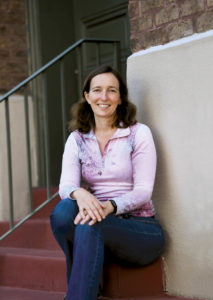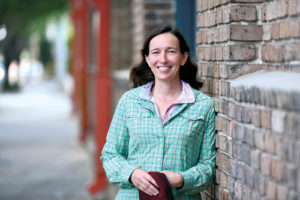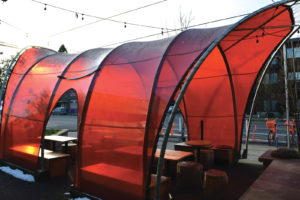 As a small business owner you have to be able to adapt to many different situations and needs,” says Amy Poe, owner of Wyckam in Portland, Ore. “You pretty much need to be able to do everything. Even if you hire something out you still have to have a basic understanding of what it is you’re hiring out for.”
As a small business owner you have to be able to adapt to many different situations and needs,” says Amy Poe, owner of Wyckam in Portland, Ore. “You pretty much need to be able to do everything. Even if you hire something out you still have to have a basic understanding of what it is you’re hiring out for.”
Amy was working as a failure analysis engineer in the semiconductor industry with a Masters in physics when she decided to shift gears and work with her husband Kerry Poe at the sail loft he had purchased two years earlier—North Sails in Portland, Ore. In 2006 they split the company into two separate entities. Kerry retained ownership of the sail loft and Amy launched North Winds Canvas, which focused on marine and industrial canvas. “There were a lot of factors behind us making that decision, but the main reason is that selling new sails is a very different function from building new marine canvas,” Amy says. “It made it simpler to have two companies.”
Targeted growth
As the company grew, Amy took on more prototyping and design work of sewn goods and in 2015 rebranded the company as Wyckam. (“Wyckam” is an acronym for the family’s first names: WY for son Wyatt, C for son Carlisle, K for Kerry and AM for Amy.) “The marine market here in Portland is fairly limited,” she says. “The name change allowed us to step outside of the ‘canvas box,’ and take on more artistic and creative projects. By adding industrial, residential and commercial projects we picked up architects, engineers and landscape designers as clients—and now our market is much bigger. It’s enabled us to try new things without feeling like there’s a constraint on our growth. And now we are able to pick and choose which projects we want to take on.”
The other growth area for Wyckam has been short-run manufacturing lines for local Oregon companies that have small-volume manufacturing needs. “This works well for companies that need the work done quickly. Because it’s short-run manufacturing, people aren’t expecting China prices,” Amy says. “Picking up that kind of business has really helped us keep busy through the winter, which is traditionally the time when marine business lags.”
The types of sewn goods Wyckam designs and manufactures for short runs varies widely, including work it does for the EarthCruiser line based in Bend, Ore. Amy and her team manufacture all the upholstery and soft goods for the company’s custom-built overland expedition vehicles.
Another client is Kodama Zomes LLC out of Jacksonville, Ore., a company that manufactures artistic hanging loungers that are the synthesis of geodesic domes and zonohedral polygons (as found in natural geometry). Wyckam makes the covers for the “zomes.” “For both of these lines, they’ll place an order for one or two—or six—and they’ll tell us what colors they need and we’ll build them to order,” Amy says. “It works well for the volume these companies have because they can deliver their products to their customers quickly without having to stock them.”
The right stuff
At the company’s inception, Amy did all the estimating, design and administration, as well as running the production floor. A year and a half ago, she was able to bring on production manager Matt Mooney—after  several years of looking for the right person for the job. “I had tried before to bring someone into that position, but it’s difficult to find someone capable of managing things with their own style while still doing it in a way that’s consistent with my own business philosophy and goals,” Amy says. “And it’s difficult to let go. We worked together for many months until I felt like he was trained. Now it’s wonderful having him because I’ve been able to focus more on design work and acquiring more short-run production work.”
several years of looking for the right person for the job. “I had tried before to bring someone into that position, but it’s difficult to find someone capable of managing things with their own style while still doing it in a way that’s consistent with my own business philosophy and goals,” Amy says. “And it’s difficult to let go. We worked together for many months until I felt like he was trained. Now it’s wonderful having him because I’ve been able to focus more on design work and acquiring more short-run production work.”
The business philosophy Amy embraces includes making decisions based on what she would want if she were on the other side of the transaction, and paying close attention to communication.
Defining communication expectations and preferences is particularly important during the prototyping process, Amy says. She begins the relationship by clarifying how much the client wants her to design and how much they want to manage themselves. “Some people want to be very involved with the details, and others tell us to do it however we think it works best,” she says. “Next is to keep them informed. There are the rare clients who don’t want to be bothered with the details, but most are grateful for the communication and just want to be kept updated.”
Setting new sails
For the past five years Wyckam has also ventured into the shade sail and tension structure market. “Working on shade sails and tension structures has been the most interesting development for us lately,” Amy says. “Every single one is a new and interesting challenge—figuring out how to cover what the client wants covered and have it look the way they’re expecting it to look. Between the CAD design and attachment challenges, each one is different, and we’re still learning.”
Amy welcomes the challenges that entering uncharted territory brings, despite the risks that accompany the opportunity. “When you’re learning new things and constantly pushing the boundaries, sometimes things don’t work as you expected,” she says. “We stand by our products, though. Even if
it’s something new and experimental, if it doesn’t work initially, we’ll find a way to make it work.”
Canvas products, shade sails, short run production—with each new market segment and the myriad of projects that accompany them, Amy returns to her physics background to bring them to fruition. “I think that my background guides my approach to challenges I’m faced with,” she says. “When I am presented with a problem, first of all I research it. Then I break it down into manageable sections. I tackle or delegate each portion depending on what will give the best outcome. Breaking down big complicated projects into small pieces helps me manage effectively and efficiently.”
 When Portland, Oregon–based artist James Harrison of James M Harrison Art & Design came up with the conceptual design for a dining shelter for a group of six micro-restaurants in Portland, Ore., he contacted Wyckam to help him create it. Harrison, who also acted as project manager, conceived of a brightly colored enclosure to shelter diners and provide a sense of sunshine in Portland’s often grey and rainy climate.
When Portland, Oregon–based artist James Harrison of James M Harrison Art & Design came up with the conceptual design for a dining shelter for a group of six micro-restaurants in Portland, Ore., he contacted Wyckam to help him create it. Harrison, who also acted as project manager, conceived of a brightly colored enclosure to shelter diners and provide a sense of sunshine in Portland’s often grey and rainy climate.
The 12-foot tall,16-by-32-foot structure dubbed the Land Yacht is made from orange welding vinyl, greenhouse pipes and salvage timbers, and Wyckam handled the cover’s patterning, fabrication and installation. “This was one of the first non-shade sail projects we did using MPanel software, so it was a challenge just learning how to use that software for a large complicated three-dimensional structure,” says Wyckam owner Amy Poe. “It was a totally unique design. It’s so grey and rainy here all winter, but the Land Yacht really brightens up the whole street, while providing a cheery and dry place to eat.”
You homeschool your two children Wyatt and Carlisle. How do you feel they benefit from being educated within the family business?
I think it’s a great education. They come with me to job sites, and much of their reading, writing, math, social studies and history is being learned through everything we do living daily life. I take the time as we do things to explain the why and what, and instruct them as needed. It’s amazing to watch them build things from random supplies and materials they find. They’re each creative in different ways and when they work together, they come up with something even more incredible than they might have individually. Being able to homeschool has truly been the best part of having my own business!
 TEXTILES.ORG
TEXTILES.ORG


